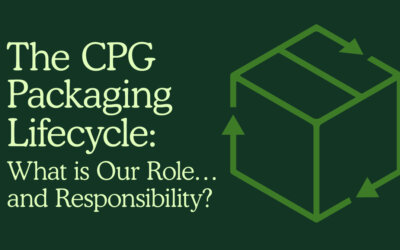Sustainability
The Path to a Greener Future
A Peek into Sustainability Efforts in the UK

Liz Reese
Sr. Creative Director
October 17th, 2023
On a recent trip to my homeland, England, I witnessed a remarkable wave of sustainability sweeping across Europe. The Amsterdam airport was adorned with fleets of solar-powered buses navigating the terminals, while the English Channel showcased endless wind turbines and wind farms harnessing the wind’s energy as far as the eye could see. The airlines themselves also promote sustainability through reductions of carbon footprint, by using less-polluting planes and more sustainable fuel. Landing in the UK, the car rental company proudly announced a goal to have 40% of its fleet as electric vehicles by 2024. And watching groundbreaking news: Vauxhall’s inaugural electric vehicle (EV) factory was to open that week.
Having spent over a decade in the United States, I couldn’t help but notice the remarkable strides Europe is making in combatting climate change. But my curiosity drove me beyond corporate boardrooms, leading me to explore how this profound shift was influencing everyday consumers and innovative brand endeavors. Particularly, I sought insights into the country’s efforts to recycle and re-use packaging and curb the plastic threat to our oceans, knowing that 76% of UK consumers try to act in a way that is not harmful to the environment, according to Mintel.
Tesco’s Sustainability Initiatives: Re-use and Recycle, Responsibly
A trip to Tesco, one of the UK’s largest supermarket chains, revealed a commendable commitment to sustainability. Tesco’s efforts aren’t mere rhetoric; they translate into tangible changes aimed at reducing environmental impact and promoting responsible consumer behavior.
Tesco’s Reuse initiative is immediately evident. It addresses the issue of single-use plastic bags by offering netted drawstring bags for fresh produce. These reusable bags, designed for multiple uses, effectively reduce plastic waste. Like many of the retailers in the UK, Tesco has also taken the bold step of charging for carrier bags and offering reusable bags for purchase, fostering a sustainable mindset among consumers.
Reuse also encourages recycling at Tesco. Strategically placed bins at store entrances encourage the responsible disposal of items like hangers, ink cartridges, batteries, and makeup, diverting them from landfills. Beyond the store’s boundaries, Tesco offers bins for recycling soft plastics, carrier bags, and clothing, making recycling accessible even beyond grocery purchases.
Walking the aisles, many brands are being transparent and empowering consumers to make eco-conscious choices and reduce unnecessary waste. The health and beauty section at Tesco further underscores a commitment to plastic reduction. Multiple brands in this section actively promote eco-friendly packaging. One brand proudly claims that its entire packaging is made from 100% recycled ocean-bound plastic, demonstrating a dedication to repurposing materials that might otherwise harm marine ecosystems.
What caught my eye in terms of shelf stand-out was Ariel, a well-known laundry detergent brand, showcasing innovation in the fight against plastic waste. The brand’s detergent container is crafted entirely from cardboard, featuring a secure locking mechanism that preserves the freshness and integrity of detergent pods while also being child safe.
This design not only reduces plastic usage, but also reflects creative thinking in sustainable packaging. (Read our recent post for more on.)
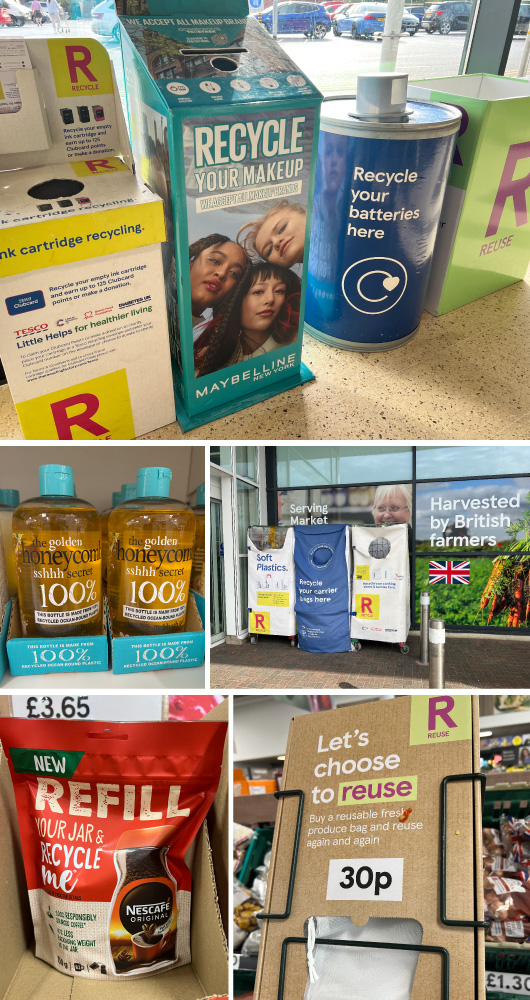
What caught my eye in terms of shelf stand-out was Ariel, a well-known laundry detergent brand, showcasing innovation in the fight against plastic waste. The brand’s detergent container is crafted entirely from cardboard, featuring a secure locking mechanism that preserves the freshness and integrity of detergent pods while also being child safe.
This design not only reduces plastic usage, but also reflects creative thinking in sustainable packaging. (Read our recent post for more on.)
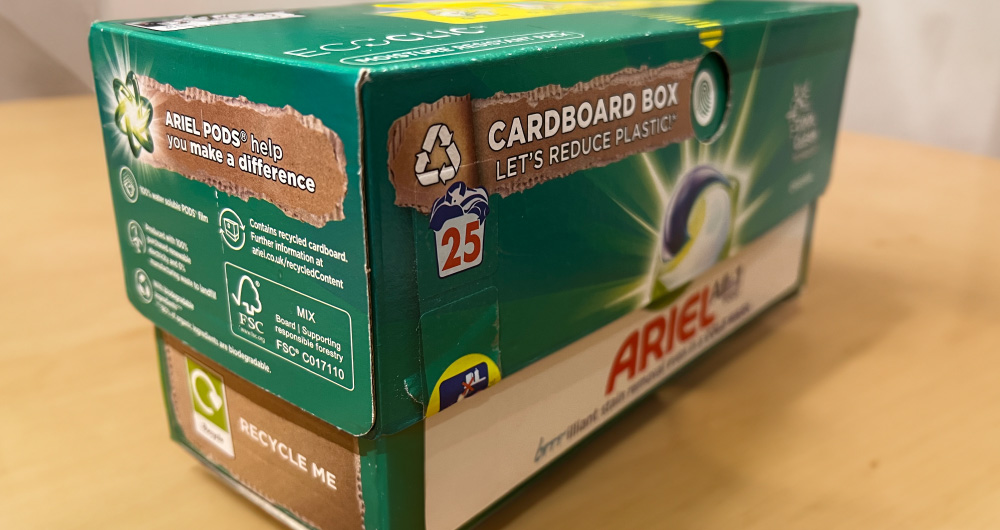
In conclusion, a visit to Tesco provides firsthand insights into how a major supermarket chain actively implements sustainability initiatives. Tesco’s endeavors range from reducing single-use plastic bags to promoting recycling through transparent packaging labeling. The company’s commitment to sustainability is evident throughout the store and sets a compelling example of how large corporations can play a pivotal role in fostering environmental responsibility. Again, this isn’t mere rhetoric; it represents a tangible transformation that benefits both the planet and shoppers.
Asda’s Sustainability Innovations: Refillable, With Some Reservations
A recent visit to Asda, a prominent UK supermarket, unveiled a profound commitment to sustainability, particularly through emphasis on promoting refill options. The most outstanding feature I came across was the “Refill Zone,” nestled at the back of the store. It transcends mere dedication—it represents an eco-conscious oasis within the bustling retail landscape.
Asda’s “Refill Zone” invites shoppers to partake in a transformative shopping experience. It encourages customers to embrace sustainability by purchasing reusable containers and selecting precisely weighed products, such as pet food, cereal, or pasta amongst others, for which you pay solely for the product itself, excluding any wasteful packaging.
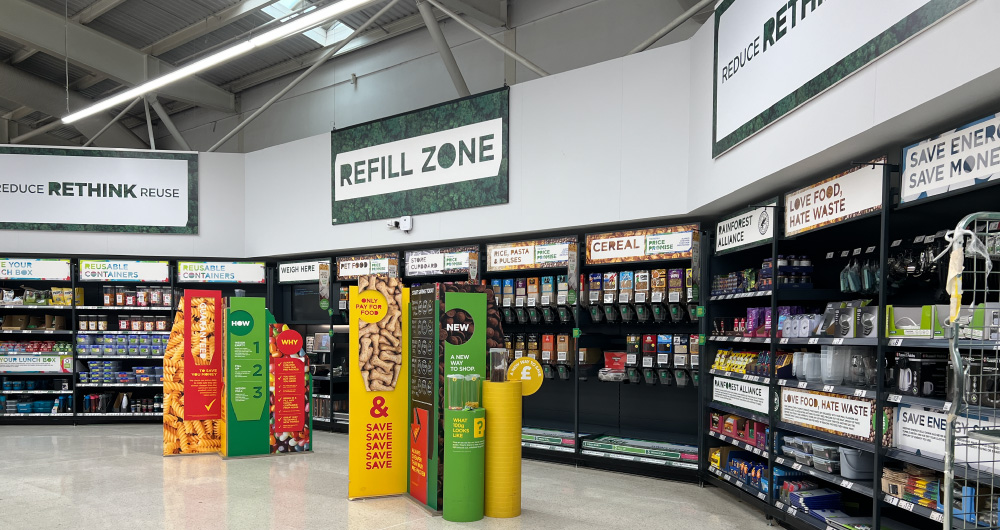
However, the reception of this concept is not without reservations. During a couple of visits, I only witnessed one shopper browsing this innovative section. Talking with friends and family, there is a perception that this approach could appear relatively expensive, despite Asda’s claims of long-term cost savings. (We uncovered similar notions when researching the environmentally friendly packaging strategies brands can’t afford to ignore.) This mixed response underscores the need for education and awareness regarding the economic and environmental benefits of refill systems if it is truly to be a success.
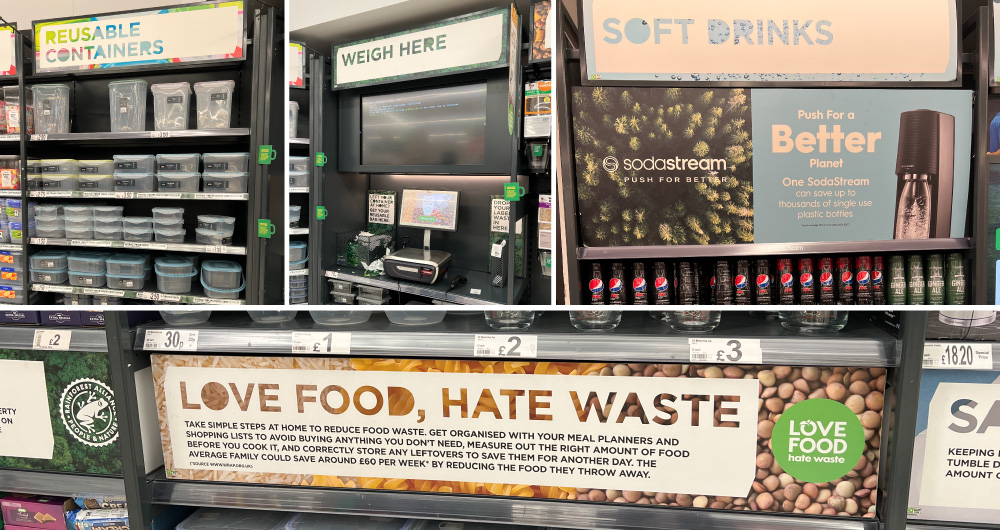
At UK Supermarkets, Sustainability is a Big Deal
These observations underscore the UK’s steadfast commitment to sustainability. The nation is increasingly mindful of its environmental footprint, and supermarkets like Asda lead the charge with initiatives challenging conventional shopping habits.
From the promotion of reusable bags to a dedicated focus on recycling, the UK is making significant strides toward a greener future. However, obstacles and skepticism persist, exemplified by the cautious reception of refill initiatives.
It is crucial to recognize that while some consumers may find refill options more expensive initially, their long-term benefits and positive environmental impact are undeniable. The UK’s sustainability efforts inspire nations worldwide, demonstrating that meaningful change is attainable through a harmonious blend of government policies, corporate responsibility, and informed consumer choices.
As we continue on the path toward a more sustainable future, it is imperative that we collectively embrace, support, and nurture these initiatives. They are not mere steps toward a better world, but also legacies for the generations to come.
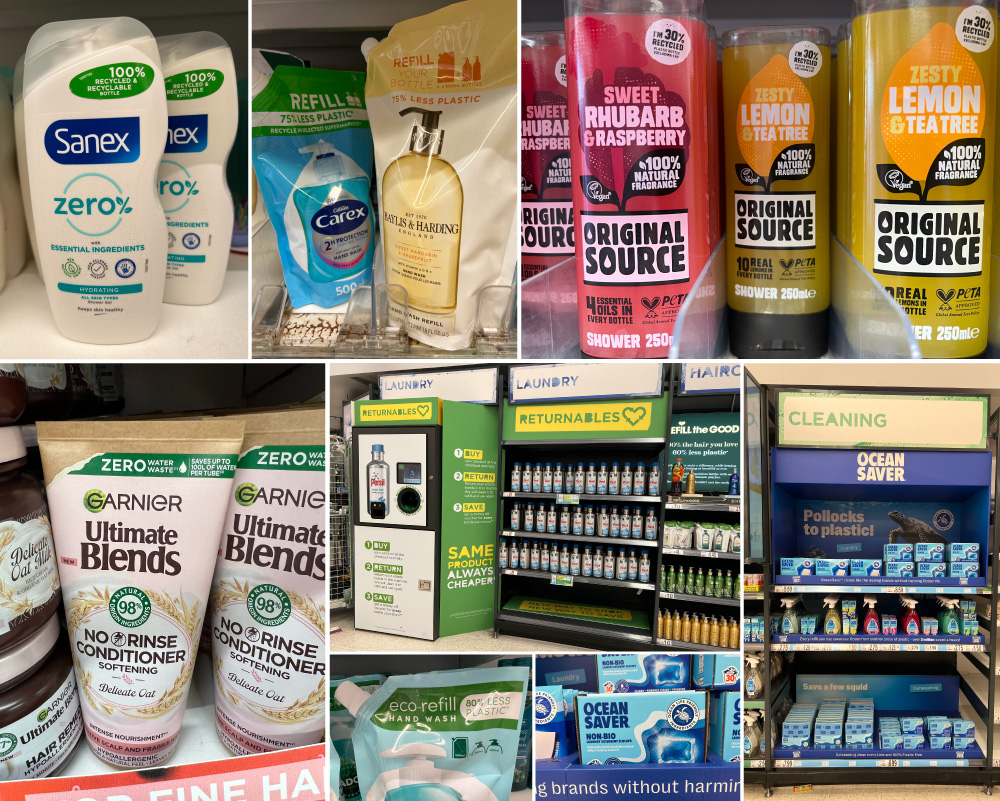
More Insights
The CPG Packaging Lifecycle: What is Our Role…and Responsibility?
How would packaging design change if we cared as much about its afterlife as we do its shelf impact? How can we apply creativity, insight, and practicality to every stage of a package’s lifecycle? And what might we discover when we follow our designs beyond the shelf and into the systems that give them a second life?
What we Loved, and What we Missed at Sweets and Snacks 2025
At Sweets & Snacks 2025, flavor innovation stole the show, but something was missing. While branding dazzled, structural packaging design barely made a ripple. We’re diving into why that matters and where brands could be pushing the boundaries. Curious what was overlooked? Let’s unpack it.
It’s 2025. This CPG Packaging Deserves a Re-Design
From impossible-to-open seals to wasteful single-use plastics, we asked our team what packaging frustrations they’d love to fix this year. The answers? Smarter resealability, better portioning, and sustainability upgrades galore. See what made the list—did your biggest packaging pet peeve make the cut?

